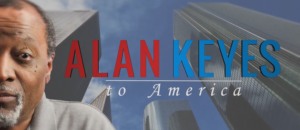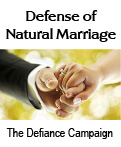Hashing out the Declaration
By Alan Keyes
July 4th, 2001
Independence Day celebrations around the country this week will offer plenty of fireworks, parades and barbeque. I hope that we will all remember as well to include some time of specific reflection on the events commemorated in the anniversary we are observing.One way to do this is to include something at our gatherings with family, friends and neighbors that might, at first mention, seem designed to cause discord rather than harmony , religion and politics. I think that our Fourth of July parties are incomplete without some good political argument, and I would even suggest throwing in some religion for good measure.
On the Fourth of July, 1776, the people of America declared themselves independent of the patronizing but timeless opinion that regular people are incapable of conducting their own affairs. They declared that government is not a higher being in which the people expect to find a virtue they do not have within themselves, but rather an instrument of the people, by which is expressed the people's resolve to manage their own affairs according to prudence and decency. The Declaration proclaims that we can not only talk about religion and politics, but that we can do so well enough to base the government of our society on the conclusions we reach.
Of course, it is the Senate, not the typical family dinner gathering, that is traditionally called "the world's greatest deliberative body." Does the quality of American government really rise from below? For some of us, at least, the thought of nations being governed by the kind of political discussions that occur at dinner might be a bit frightening. Is there good reason to think that we, the people, really can supply the foundation of good sense that makes republican government possible?
The Declaration supplies such good reason, in speaking of the laws of nature and of nature's God. But what are they? Locke, to whom the Founders looked, said that the "state of nature has a law of nature to govern it, and reason, which is that law, teaches all mankind who will but consult it that, being all equal and independent, no one ought to harm another in his life, liberty, or possessions." Here is plainly put the creed that the first principles of political justice are taught by reason to "all mankind who will but consult it." If Locke, and the Declaration, are correct, then it really is true that all willing men are capable of knowing and applying the first principles of political life.
Revelation confirms this view, teaching that even the unbelievers have a law "written on the heart." Reason and revelation agree that men can, by their natural powers, discover the natural law, as well as their own obligation to act in conformity with it.
Whatever differences of circumstance and capacity may divide us, this fundamental moral equality of all men as created is grounded in what makes us men and not beasts , our reason and the free will that must accompany it. These high faculties are likenesses of the Maker Himself and reveal to us the correspondingly high destiny for which He has made us. The Declaration is not bashful about these things, but calls them self-evident, as indeed they are to those who "will but consult" reason itself.
Our institutions and Constitution presume the power and role of reason. Reason, and not merely "free expression," is the ground of the First Amendment. We must be free to speak and write and publish so that we can take reasonable counsel together to govern ourselves well. And we have a duty to act in accordance with what reason, illumined by the grace of faith, teaches us concerning the Creator.
All our history , The Northwest Ordinance, Washington's Farewell address, Lincoln in the Lyceum speech, the Constitution itself, and on and on , has assumed that a free and simultaneously ignorant or passion-driven people is an absurdity. Faith in our capacity to think together about what it is right and good to do has been the founding and enduring act of self-confidence upon which self-government is based.
Today, with a national politics grown increasingly superficial, posturing and merely tactical, it can seem that the last thing any of our politicians really wants is a principled discussion of what justice or prudence requires. And yet signs of life from below remain. When we all complain of "sound bites and Madison Avenue ... or Hollywood" politics, what are we doing but reverting to our founding postulate that men can, indeed, as the Federalist Papers put it, govern themselves "from reflection and choice"?
This Fourth, do your small part to strengthen the foundation of self-government. Ask your family, your friends, or whomever you are with, to join with you in discussing the relevance of the Declaration to our politics today. It is a good thing to read the Declaration aloud on the Fourth, and then to talk about it. What are the implications for tax policy, for abortion, or for foreign affairs, of the self-evident truth that "all men are created equal"?
When the sovereign decides how things should be, he issues his orders and attempts to make them so. In America, the people are sovereign, and it is up to us to think well and hard about how things should be, and then to act. Our great Declaration tells us what we should already know that if we are but willing to seek truth and justice with open mind and heart, and putting passion aside, we will be able to find it, at least sufficiently to do our duty. In America, discussions of politics and religion are not the idle musings of servants, but the potent deliberations of power.
This, more than anything, is the legacy of the Fourth, and there is no more fitting way to remember the great deeds of 1776 than by turning with renewed vigor to the never-ending task of searching together to learn what is right, so that we may dedicate ourselves anew to its accomplishment.
Originally published at WorldNetDaily.


 Alan Keyes to America
Alan Keyes to America
